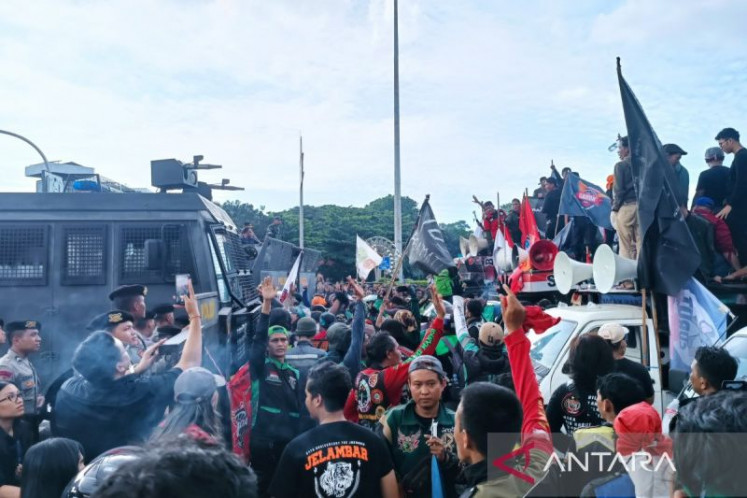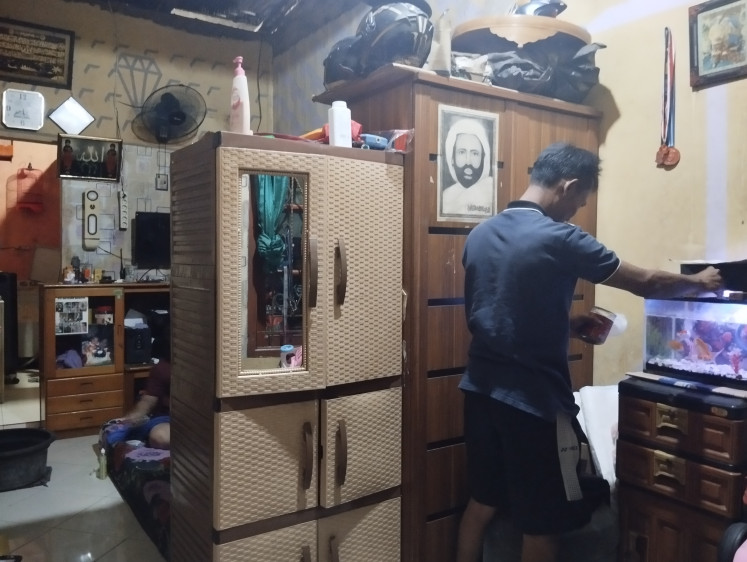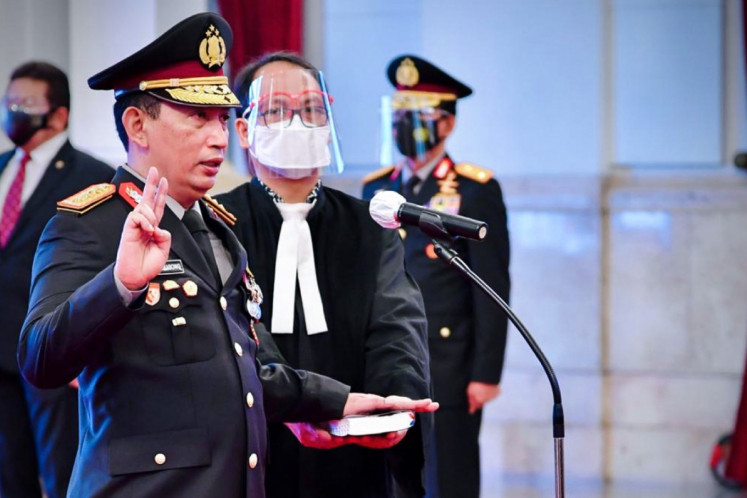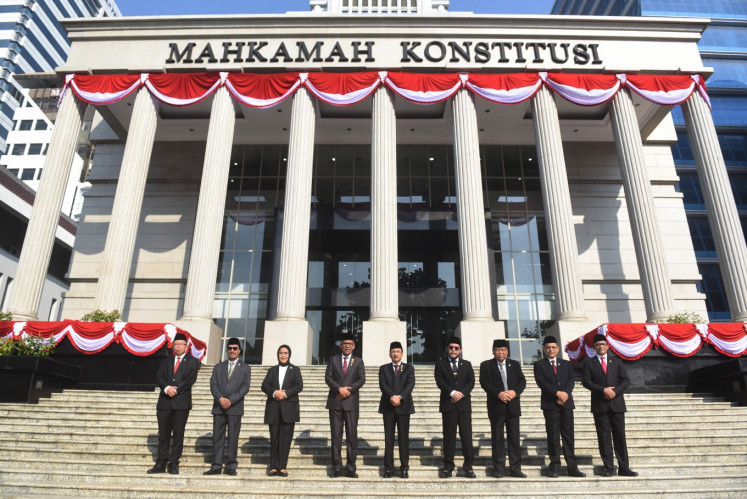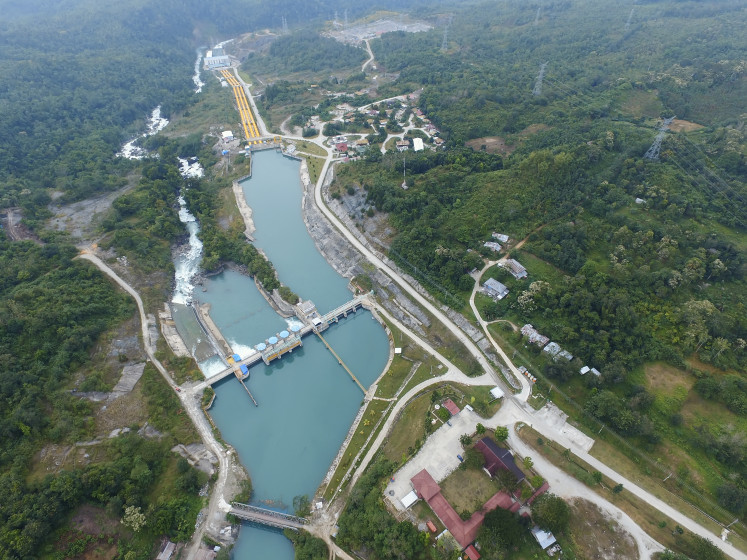Popular Reads
Top Results
Can't find what you're looking for?
View all search resultsPopular Reads
Top Results
Can't find what you're looking for?
View all search resultsP2P lending: Setting new trends to reach MSMEs and women
Fintech lenders are helping individuals and MSMEs contribute to Indonesia's economic growth through improved access and inclusiveness, including the "missing middle".
Change text size
Gift Premium Articles
to Anyone
 Stock illustration of digital financial services (Shutterstock/Zapp2Photo)
Stock illustration of digital financial services (Shutterstock/Zapp2Photo)
P
roviding greater access to financing is an important part of driving economic growth. For more inclusive growth, it is essential that credit be more accessible to unbanked and underbanked individuals. This also applies in particular to micro, small and medium enterprises (MSMEs), as they have a multiplier effect on economic growth.
Compared to other countries in the region, Indonesia has a very low loan disbursement per gross domestic product (GDP) ratio.
As PricewaterhouseCoopers Indonesia has noted, lack of access to inclusive financing makes it more difficult for Indonesian consumers and MSMEs to spur economic growth. The country’s regulators and policymakers, especially the Financial Services Authority (OJK), have realized that traditional financial services institutions alone, via their brick-and-mortar offices, are unable to meet the credit demand of millions of Indonesians.
According to the OJK, new digital technologies have been able to create a new digital revolution in the finance sector by increasing speed and transparency, reducing costs and providing access to financially underserved communities. With the rapid growth in its population of digital consumers, high penetration of mobile internet users and over 150 fintech firms, Indonesia is on the brink of becoming one of the biggest digital economies in Asia.
Indonesian fintech companies are turning financial services into an engine of economic growth. They are opening up financial access and becoming catalysts for rapid growth of the digital economy through a wide range of innovative and interconnected financial services, especially in digital marketplaces and peer-to-peer (P2P) lending.
By last December, 149 P2P lenders were registered with the OJK. Of these, 139 firms were conventional P2P lenders and 10 were sharia-compliant P2P lenders. Their cumulative loan disbursement totaled Rp 155.90 trillion (US$10.7 billion), while their outstanding portfolio totals Rp 15.32 trillion in current loans. The past year saw monthly loan disbursements averaging Rp 6 trillion to Rp 8 trillion, except in March when the C0VID-19 outbreak emerged and in May, when monthly disbursements hit a low of Rp 3.12 trillion.
About 67.2 percent of P2P borrowers are in the 19-34 age group and almost 30.4 percent are 35-54. In terms of gender distribution, 47.2 percent of borrowers are women and 52.7 percent are men. Most borrowers are individuals or smaller MSMEs, with big companies comprising only 0.10 percent.
Apart from numerous small investors (or “lenders” in Indonesia), larger corporate investors and banks are increasingly turning to P2P lending platforms to provide their financing products. The number of lenders in this category increased 18.32 percent in 2019-2020.
The pandemic clearly impacted all lenders, including those in Indonesia’s P2P sector. However, many played a key role in shifting financing to fast-growing industries during the pandemic. This was particularly significant to supporting the supply chain in the healthcare industry, where new firms needed quick access to working capital loans.
The significant increase in new borrowers, as well as in new individual and corporate investors (lenders), necessitated improvements to the OJK’s regulatory framework, especially in consumer protection. The OJK has been fortunate to learn from the experiences of other countries in how best to provide a supportive and enabling regulatory environment. More importantly, the regulator has learned from markets in countries like the United Kingdom, where the Financial Conduct Authority (FCA) tapped the industry early to form a self-regulating body to monitor the financial regulator’s market conduct oversight.
The P2P lending industry’s rapid growth also made it clear that the OJK needed to work closely with the industry to ensure the growth of responsible lenders. To better support this, the Indonesian P2P Fintech Lending Association (AFPI) also learned from the experiences of the UK and other industry associations around the world to adopt a world-class code of conduct. This unique public-private partnership helps to further strengthen best practices and improve consumer protection.
“As much as 60 percent of the businesses that we finance through our invoice financing were unable to get financing from a bank,” said AFPI chair and Investree CEO Adrian Gunadi.
“MSMEs are underserved. In Indonesia, if you [want to] ask for a working capital loan, your company needs to record three years of profit. Banks want two to three of years credit history and collateral, which many MSMEs do not have.”
Investree, like many other P2P lenders, does not require collateral. It instead focuses on the buyer’s strengths, looking at their cash flow, their contracts with blue-chip companies or government and other factors.
Since most of Investree’s business comes from invoice financing, it invested in integrating its financial programs with an e-procurement system to help determine loan approval. It also uses machine learning and alternative credit scoring to determine the preapproved loan limit for its customers.
These new technologies, along with advances in smartphones, also make it easier for MSMEs to apply for loans and for P2P lenders to process them, and even facilitate repayment through timely reminders.
Reynold Wijaya of Modalku also views P2P lending as a way to help MSMEs access financing. When Reynold met former classmate Kelvin Teo at Harvard, the pair decided to form a company that would provide a positive impact in Southeast Asia, especially Indonesia. Seeing the rapid growth in Indonesia’s e-commerce sector, they saw an opportunity to offer supply chain financing, especially suppliers in the digital economy.
Modalku finances the “missing middle”, a financing gap that banks are unable to fill, especially new e-commerce MSMEs that need simple and quick access to short-term working capital loans without providing collateral.
“Technology and speed are the key drivers of growth. We also finally connected to an e-commerce platform, [which] was when we were able to provide automated loans,” said Reynold. “Modalku has [to date] disbursed more than 3 million loans worth more than $1 billion to Indonesian MSMEs.”
Another segment of borrowers that is benefiting from P2P lending growth is female business owners. Amartha, one of the largest P2P lending platforms for women, started out in 2010 as a brick-and-mortar microfinance NGO in Bogor, West Java.
“Providing digital financial services is the goal of Amartha, so we would like to be the one-stop shop for [rural customers], especially women, in accessing affordable financial services,” explained Aria Widyanto, Amartha’s chief risk and sustainability officer.
Amartha’s conventional microfinance model had limited impact, as it has disbursed just $2.5 million in loans to 11,000 borrowers between 2010 and 2015. After learning about P2P lending from the UK and the US, the company reinvented its lending model in 2016 to focus on P2P lending. Since then, Amartha has grown exponentially to disburse loans totaling more than $215 million and reach more than 600,000 female borrowers as of 2020.
***
Bido Budiman is a digital payment consultant with the UK Foreign, Commonwealth and Development Office’s ASEAN Economic Reform Programme in Indonesia; John V. Owens is an expert on fintech, P2P lending, digital payments and fintech regulation, and the fintech lead for the ASEAN Economic Reform Programme.




